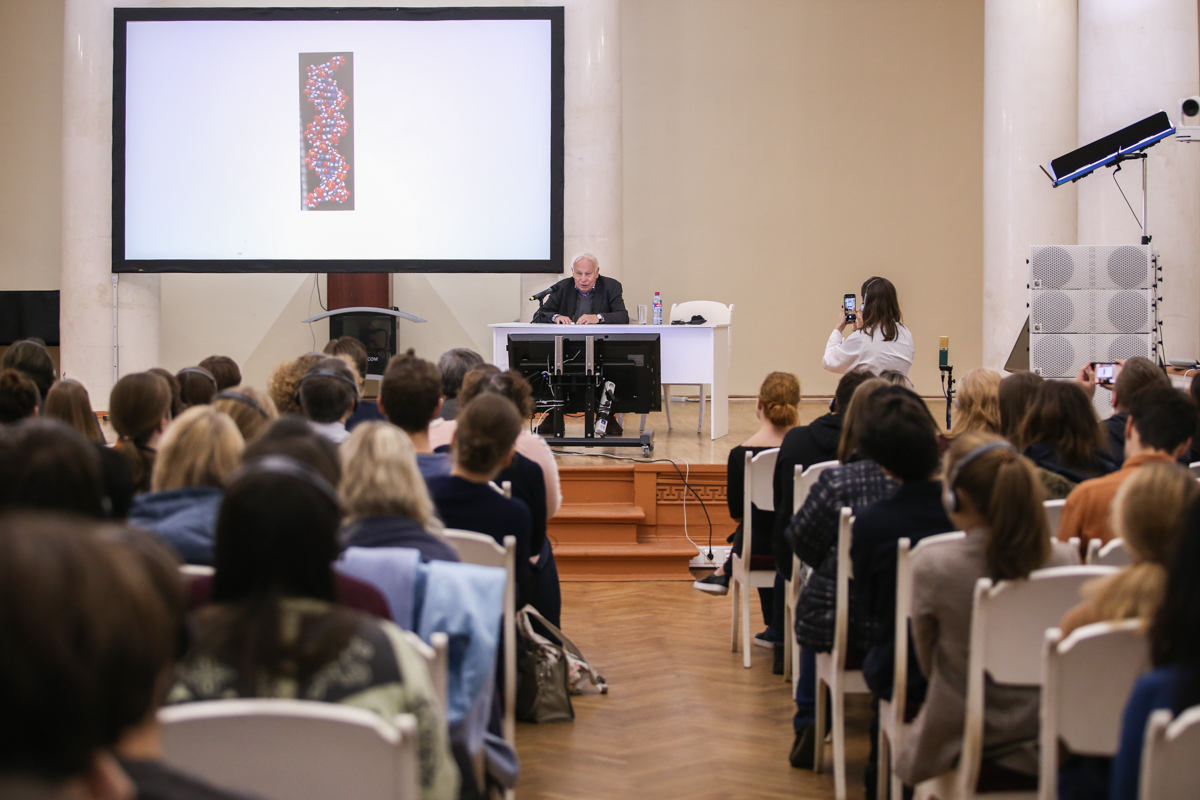Tomas Lindahl: ‘Cancer is caused by oxygen and water, and there is nothing we can do about’
The 2015 Nobel Prize laureate in Chemistry, Tomas Lindahl, spoke during the national festival NAUKA 0+ at St Petersburg University. He described his research in the sphere of ‘DNA repair’ and possible causes of cancer.
In 2015, the Swedish-British biochemist Tomas Lindahl together with his American colleagues Aziz Sancar and Paul Modrich won the Nobel Prize in Chemistry for ‘mechanistic studies of DNA repair’. The scientists discovered a mechanism by which cells find damaged genomes and repair them, using damaged DNA strand as a pattern.
In his lecture at St Petersburg University, Tomas Lindahl spoke about the reasons for molecular ‘breakdown’ he managed to discover during his research and about the mutations they cause. These discoveries let the scientific community define new avenues of search for a treatment for cancer. However, as he underlined, the prospects in the field are still very vague. According to Tomas Lindahl, the main problem is that the main risk factors for cancer are the same things that maintain life: oxygen and water.
We have never deemed damaging DNA components as harmful.
Nobel Prize laureate in Chemistry Tomas Lindahl
‘It is water. The human body partly consists of water. It is a very weak reagent, and it was difficult to imagine that it can be damaging. However, at the same time it is very highly concentrated in the human body, which can lead to certain DNA damage. The same applies to oxygen: we are constantly under the influence of reactive oxygen. And it is not one little reactive molecule of S-Adenosyl methionine, there are others, which we have not yet studied. There are perhaps smaller molecules that damage DNA. As soon as we get to define them, and the exact DNA damage they cause, we will study other possible enzymes for DNA repairing. This will help us in our research work,’ Tomas Lindahl said.
He pointed out that the variety of types of damage requires a variety of repair strategies, there are many of them, not just one or two enzymes (or ferments). ‘Many of those are still unknown, undiscovered,’ the scientist emphasised.
The professor reminded that the first life on Earth was anaerobic: the first organisms on the planet existed without oxygen. The emergence of oxygen was in a way a catastrophe, because many representatives of the oldest fauna could not adapt to the new living conditions and died. This is why the influence of oxygen on a human body cannot be underestimated, the Nobel Prize laureate thinks.
Tomas Lindahl named the main risk factors for cancer that are accepted by science: ultraviolet rays; ionising radiation; diet; smoking; metabolism; DNA replication errors; and endogenous DNA damage by water and oxygen.
However, according to Tomas Lindahl, the majority of these factors are not critical for studying the causes of cancer: ultraviolet rays can only cause skin cancer; ionising radiation is faced by a minimum number of people; whereas smoking, though the professor emphasised the high risk of this bad habit, is mainly a cause of lung cancer.
As for cigarette smoke, it contains components that provoke lung cancer, which is a very unpleasant form of the disease. So smoking is a very bad idea, and if you smoke you must take into account that you shorten your life.
Nobel Prize laureate for Chemistry Tomas Lindahl
According to Tomas Lindahl, the role of diet in the development of cancer is overestimated, and the risks connected with metabolism or DNA replication errors are very rare. Thus, in his view, although the aetiology of most of kinds of cancer is still unknown, the causes are to be found in the organism. ‘Oncological diseases have a genetic component. Most of them are caused by oncogene and oncosuppresor gene mutations. That is why we must protect ourselves and prevent normal cells from uncontrollable growth, which can also cause cancer. But what provokes those mutations? Everybody wants to know oncology risk factors to nip them in the bud. However, we still do not know much about them,’ Tomas Lindahl said.
According to the professor, cancer in non-smokers is almost always a mystery. He believes that endogenous DNA damage by water and oxygen are a key to finding the answer, though it is unlikely that this problem will ever be solved. ‘There are not enough data to figure out the causes of cancer in non-smokers, that is why we tend to deem endogenous DNA damage and DNA damage due to water and oxygen as very important. It is worth keeping this in mind. There are a number of initiatives connected with cancer research, such as ‘we must find cancer’, or ‘we must find a cure’. However, we cannot fight oxygen and water in a human body! We must accept the fact that we live in a liquid with a temperature of 37 °C, and the air we breathe consists of oxygen. This is what causes cancer, and there is nothing we can do about it, these are just risk factors,’ Tomas Lindahl concluded.
After the lecture St Petersburg University presented the professor a gift – a book on the history of the University.
The organisers of the National Festival of science NAUKA 0+ were the Ministry of Science and Higher Education, Lomonosov Moscow State University, and the Russian Academy of Sciences. The lecture was supported by the Institute of Macromolecular Compounds of the Russian Academy of Sciences, All-Russia Research Institute for Agricultural Microbiology, and the Vavilov Society of Geneticists and Breeders.




